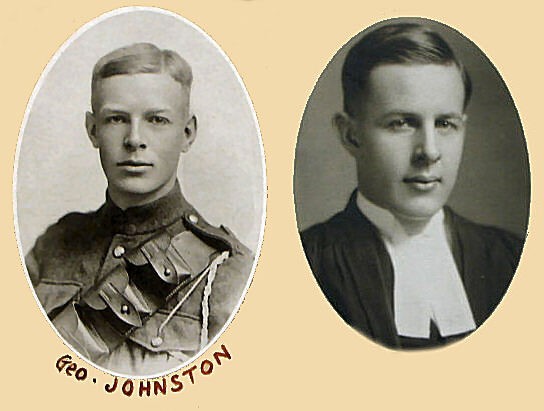
Osgoode Hall Law School Has Survived Challenges Before, and Will Survive Them Again
The outbreak of the COVID-19 pandemic and the subsequent shutdown of most of Canadian society, including the cancelling of all in-person instruction here at Osgoode Hall Law School, is not how I envisioned the end of my 2L year going. I am worried for my family, I am worried for my friends, I am worried for our classmates, I am worried for our professors, I am worried about York University staff who work so hard to keep our school as great as it is, and I am worried about what the next several months hold for us all. How long will this go on? Will our summer positions go forward? Will things return to normal by next August, and the start of the 2020/21 school year?
I think it is important to remember that although we may not have the answers to these questions today, what we do have is one another to lean on. The student body at Osgoode Hall Law School has a long history of resilience and perseverance, and we’ve been through dark times and immense challenges before. It is also important to provide ourselves perspective, and consider the sacrifices made by generations before ours.
During World War I, classmates George Johnston and Frank Boles left the relative comfort of life in downtown Toronto as students at Osgoode Hall Law School to fight in the trenches of the Western Front in Europe. A life filled with lectures, seminars, studying, and pints at the pub was replaced with one filled with the harsh reality of trench warfare. Enduring trench rot, avoiding relentless and never-ending German shelling, spending day and night combating the wet and cold, and rarely enjoying a warm meal became the new reality for Johnston and Boles.
These, unfortunately, were not the only sacrifices the Osgoode Hall classmates made. Johnston, fighting in the legendary Battle of Hill 70 between the Canadian Forces and the German 6th Army in August of 1917, was permanently blinded after German forces shelled his position with mustard gas. Although the battle would result in a victory for Canadian and Allied forces—and Johnston would forever become a hero to his nation and Osgoode Hall Law School —this victory came at a steep cost.
Frank Boles also sacrificed greatly during the war. In fact, Boles would make the ultimate sacrifice in service to his country and would never leave the battlefields of France to return to Osgoode Hall Law School. However, Boles’ death was not in vain. His sacrifice helped the Allied forces achieve victory, and ensured the continued safety and prosperity of his community, and his fellow Osgoode Hall classmates.
Sadly, as we all know, the First World War was followed by a Second, roughly twenty years later. It was during this Second World War that George Graham Sinclair—of the class of ’33 —helped lead one of the most daring military assaults in the history of modern warfare: the raid on Dieppe. Captain Sinclair, an officer in the Canadian Army with the Royal Regiment of Canada, died in the ill-fated raid at the young age of 35—less than 10 years after graduating from Osgoode Hall. When the Canadian newspapers learned of his death, one declared, “Dieppe Hero is Listed Dead,” on its front page. That paper, the Globe and Mail, would go on to explain that Captain Sinclair died from wounds inflicted when he used explosives to breach a beachside German fortification, which allowed the safe passage of the regiment of soldiers under his command up the bank of the beach at Dieppe. Captain Sinclair gave his life for the safety of those under his command, and for his country.
Osgoode Hall Law School pays tribute to the sacrifice made by Captain Sinclair to this day, annually awarding the George Graham Sinclair Memorial Prize, named in his honour, to the Osgoode Gold Medalist. Osgoode’s most accomplished student is, year after year, awarded a prize named in honour of a national hero and Osgoode alum.
And so we should remember the sacrifices of generations past, such as those made by George Johnston, Frank Boles, and George Graham Sinclair, during challenging times like this. We should honour their bravery, their selflessness, their leadership, and their spirit by proving ourselves to be cut from the same cloth. Osgoode Hall Law School is built on a foundation of excellence laid by students like Johnston, Boles, and Captain Sinclair, and we should all endeavour to continue that tradition in our own small way.
Maintain social distancing without complaint, to protect yourself and others more vulnerable in the community. Offer to assist those who may not be able to leave their homes, like the elderly, with their errands and groceries. Be flexible and understanding with your professors and the administration at Osgoode Hall. Understand that they, no different than we, are dealing with an unexpected, and completely unprecedented situation. Endeavour to attend your online instruction sessions and finish the semester as strong as you would have in-person. And most importantly, don’t lose touch with yourself, or your friends and family—schedule online hangouts with your classmates from school, don’t be afraid to pick up the phone and call your relatives, and don’t shy away from drinking a glass of wine and allowing yourself to decompress given the stressful situation we find ourselves in. No matter how bad things get—and I won’t lie to you, they have the potential of getting very, very bad—we should all be confident in knowing that generations before ours have lived, and survived, similar crises of their own. Those generations not only survived, but thrived under the pressure, and etched their names forever in history. The same worries and fears we have today were shared by those generations before ours, and they faced them with the courage and the selflessness that the times required. I am confident that we will do the same.
